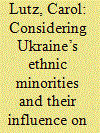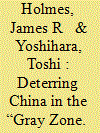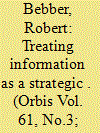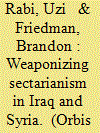|
|
|
Sort Order |
|
|
|
Items / Page
|
|
|
|
|
|
|
| Srl | Item |
| 1 |
ID:
155275


|
|
|
|
|
| Summary/Abstract |
Transnational Ethnic Alliance Theory at its core posits that the majority ethnic group in one state will come to the defense of its ethnic brethren that are a minority in a neighboring state, if that group is facing discrimination or repression. The actions of political leaders in Moscow, who claimed that they were concerned about the Russian minority in Ukraine, suggest that modifications to this theory are necessary. Intervention will only occur when it is in the self-interest of the neighboring state or in the self-interest of the governing elite of that state. Russian perceptions of threats to Russian national interests originating in the West made the interference in the Ukrainian political system more likely. Similar perceptions of threats from abroad to foreign policy interests for other states, or their leaders, could lead to support for ethnic minorities. The resulting modified Transnational Ethnic Alliance Theory can be used as a tool to predict better and explain foreign interference anywhere that ethnic groups overlap between states.
|
|
|
|
|
|
|
|
|
|
|
|
|
|
|
|
| 2 |
ID:
155276


|
|
|
|
|
| Summary/Abstract |
U.S. national cybersecurity strategy, to be effective must align with the structural features and operational characteristics of the domain. Yet, this article contends that the current U.S. strategy of deterrence, coupled with the establishment of norms in cyberspace, does not satisfy this requirement. Alternatively, a strategy of cyber persistence is proposed, one that is enabled rather than crippled by the uniqueness of cyberspace. In an environment of constant contact, a strategy grounded in persistent engagement is more appropriate than one of operational restraint and reaction for shaping the parameters of acceptable behavior and sustaining and advancing U.S. national interests.
|
|
|
|
|
|
|
|
|
|
|
|
|
|
|
|
| 3 |
ID:
155272


|
|
|
|
|
| Summary/Abstract |
If facing down a hostile actor in the “gray zone” is hard for a single actor, such as the United States, it is doubly hard for an alliance composed of actors with disparate capabilities, interests, and political fortitude. This article investigates how China has prosecuted gray-zone strategy in the South China Sea. We discern patterns in Chinese policy and strategy with the aim of helping U.S. led alliances face down aggression in maritime Asia.
|
|
|
|
|
|
|
|
|
|
|
|
|
|
|
|
| 4 |
ID:
155273


|
|
|
|
|
| Summary/Abstract |
The “America First” approach to foreign policy represents an opportunity to reassess relations with Russia. Efforts to deter Russian aggression have failed. Perhaps a new approach is needed. This article uses the lessons of the Peloponnesian War to help guide the West’s approach to Russia. By examining the three motivations for warfare—fear, honor and interest—it is possible to craft a more effective deterrent strategy while avoiding a security dilemma. Current approaches have discounted legitimate Russian fears of NATO and EU encroachment. They also have neglected the role of honor in Russia’s actions and how this impulse frames Moscow’s views of the West. Finally, NATO and the EU have lost sight of Russia’s vital interests in pursuing further eastward expansion. Where the West cannot compromise is on the security of NATO and EU members and the unity of the Trans-Atlantic alliance.
|
|
|
|
|
|
|
|
|
|
|
|
|
|
|
|
| 5 |
ID:
155271


|
|
|
|
|
| Summary/Abstract |
Recent and ongoing wartime experience has discredited much of the thinking that underpinned the “Defense Transformation” effort in the 1990s. If we are to be prepared for future conflict, it is vital that we learn from experience and adjust our thinking about war. It is time to develop idealized visions of future war that are consistent with what post-9/11 conflicts have revealed as the enduring uncertainty and complexity of war. These concepts should be “fighting-centric” rather than “knowledge-centric.” They should also be based on real and emerging threats, informed by recent combat experience, and connected to scenarios that direct military force toward the achievement of policy goals and objectives. We must then design and build balanced forces that are capable of conducting operations consistent with the concepts we develop.
|
|
|
|
|
|
|
|
|
|
|
|
|
|
|
|
| 6 |
ID:
155279


|
|
|
|
|
| Summary/Abstract |
The United States is challenged by adversaries who seek to alter fundamentally the systemic balance of power through information-based strategies. These strategies leverage both legal and illegal operations to gain influence and control over key industries and information resource domains to constrain American freedom of action. It is a larger geoeconomic and geoinformational campaign by adversaries to harvest information in support of military, diplomatic, economic, and global political goals. To respond, the U.S. government must understand that information is a strategic resource. An American response might be to erode its competitors’ economic and informational advantages, attack their dependencies on other strategic resources, and exploit their information control systems. Cyberspace operations may provide some competitive advantage, but first they must be employed effectively. This effectiveness requires overcoming debilitating intellectual constraints and adopting new operational models.
|
|
|
|
|
|
|
|
|
|
|
|
|
|
|
|
| 7 |
ID:
155277


|
|
|
|
|
| Summary/Abstract |
This article critically assesses how Vietnam-U.S. relations have evolved over the 42 years since Vietnam’s reunification in 1975. By dividing the development of Vietnam-U.S. relations into three main phases—1975-2000, 2001-2008, and 2009-the present—it analyzes the steps taken by both Hanoi and Washington to heal and build their relations. Using Vietnamese and U.S. sources, the article demonstrates why Vietnam-U.S. relations have transformed dramatically and what factors have contributed to the unusually positive relationship between Vietnam and the United States since the diplomatic normalization in 1995.
|
|
|
|
|
|
|
|
|
|
|
|
|
|
|
|
| 8 |
ID:
155278


|
|
|
|
|
| Summary/Abstract |
The last six years of insurgency, rebellion, and war have eroded territorial state sovereignty in Iraq and Syria. The scale and savagery of the war have transformed Sunni-Shia sectarianism into a zero-sum politics of survival. In other words, residents of Iraq and Syria have been forced to choose between Sunnis and Shia in order to survive. This essay explains how the diverging interests of foreign actors—Iran, the Islamic State and other Salafi-Jihadi foreign fighters, Russia, Saudi Arabia, Turkey, and the United States—prolonged the war, providing the time and space for the belligerents in Iraq and Syria to weaponize sectarianism.
|
|
|
|
|
|
|
|
|
|
|
|
|
|
|
|
| 9 |
ID:
155274


|
|
|
|
|
| Summary/Abstract |
Russia’s foreign policy decisions towards Ukraine in the context of the “Ukraine crisis” have been portrayed largely in a negative light which crudely paints Russia’s actions as being imperialistic, evil and largely irrational. This article argues that by looking at the interplay of identity and perceptions at the foreign policymaking level, Russia’s actions in Ukraine can be, to some degree, rationalized. First, Russia’s Eurasian–oriented great power role identity and its perceptions of Ukraine as represent a vital national interest. Second, the European Union and the United States are perceived as embodying a Western team of anti-Russian imperialists, which led Moscow to pursue hazardous foreign policies.
|
|
|
|
|
|
|
|
|
|
|
|
|
|
|
|
|
|
|
|
|